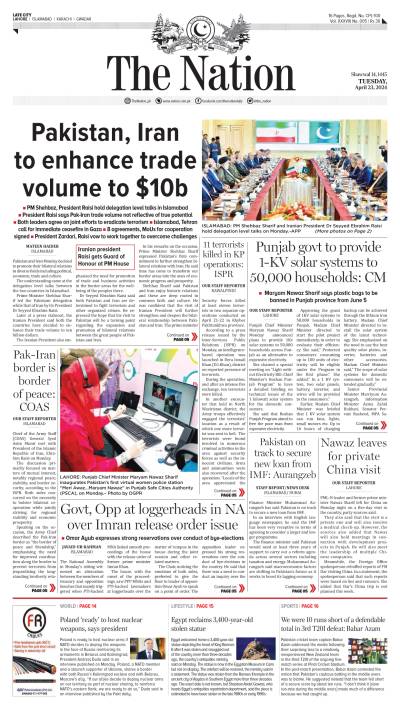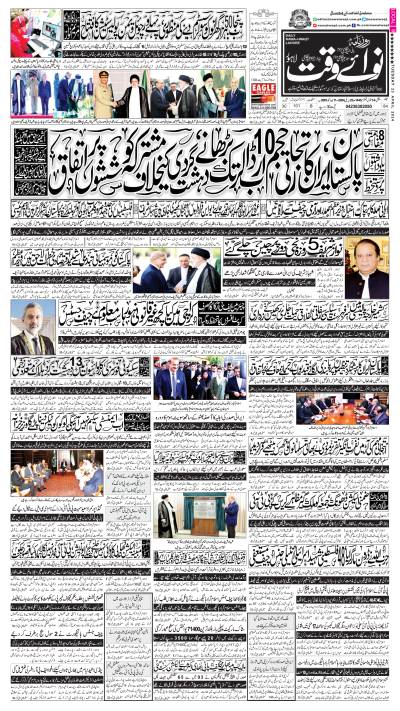People of Swat and adjoining areas have quite forcefully demonstrated that they do not subscribe to the version of Islam as projected by the extremists. Similar position was taken by the IDPs of Bajaur area a couple of months ago. This exodus indicates that majority of the people reject extremism vehemently. These people left their homes to enable the security forces a freehand in evicting the extremists. On personal count, it is indeed a significant sacrifice. These IDPs exhibit a sample depiction of what the people of Pakistan, at large, stand for; they condemn extremism and its expression through militancy. Displaced people differ from the refugees. Former is a responsibility and latter a liability. Accountability of a country hosting the refugees ends as they cross over to their own country. However, states confronted with rehabilitation of IDPs are, invariably, in for a log haul. Around two million people displaced from Swat area need care and attention in short-term as well as in long-term rehabilitation perspective. Though the world would never be the same for these unfortunate people, a lot can be done to sway them out of the trauma they are going through. Fortunately, people of Pakistan are blessed with remarkable resilience to handle crises situations of the kind. Therefore, it is expected that current issue of mass displacements would be handled satisfactorily. The factors that reinforce this conviction are: hospitable local population, numerous volunteer entities, robust national level infrastructure for calamity and disaster management, well established UNCHR set-up in the country, and above all sympathetic attitude of the world community. It is heartening that non-government functionaries, individual philanthropists and public at large have sprang into action at once. However, in the broader perspective, if the period of displacement prolongs, the onus and burden of sustaining these people in their camps would progressively shift on to the Government of Pakistan and the world community. Presumably, other agencies are geared up only for first aid kind of settlement aid for a short duration; handling such a mammoth work for a protracted period may well be beyond the capacity of any of these non-government organisations or individuals. Furthermore, handling of such a large-scale rehabilitation operation is definitely beyond the capacity of the Government of Pakistan alone. Hence, world community needs to come forward and pool in requisite resources generously, to facilitate compatible and speedy rehabilitation of these displaced people, upon their return to respective homes. There is a need to formulate a comprehensive strategy to ensure the timely and safe return of IDPs to their homes, alongside their capacity enhancement for quick rehabilitation. Return should be incremental. As and when any administrative entity is reclaimed from the extremists, essential services should be restored and then the residents should be asked to return, in manageable batches. Returning families should be provided a month's ration, adequate sustenance grant/allowance, and other necessary items/tools for early settlement. It is indeed a God sent opportunity for the world community to win the hearts and minds of displaced people through a caring approach. Now is the time to differentiate, that where extremists must be defeated and subdued militarily, the innocent majority should be won over as ideologically hardened opponents of extremism. They should return to their homes with a resolve to uproot extremism once and for all. While the military operation goes on, due care should be taken to minimise the collateral damage and necessary arrangements need to be put in place for protection of left behind properties against loot, arson etc. Security of belongings could be ensured through volunteer watchmen recruited out of each locality. There is a need to get the claims ascertained from all families who left behind their properties. These should then be verified later, through field surveys, and losses to property be estimated for each family. This data would help in determining the compensation for each family on return to their homes. Overall net estimates should be projected to international agencies and individual friendly countries for mobilising requisite rehabilitation funds. Depending upon the available finances, compensation could be paid to each claimant. Once the area is reclaimed by the armed forces, there would be a need of enhanced and sustainable security arrangement to preclude revisits by the extremist elements. Therefore, police force would need augmentation. It would be appropriate that such enhancement be done by recruiting locals. Besides providing job opportunities, force composed of locals would have the advantage of being familiar with the residents; whereby police would be able to keep a track of unfamiliar faces. It is only through such improvised measures that initial return to normalcy could be converted into sustained tranquillity. As a back up arrangement, stationing of army in the garrisons at strategic points, for an interim period, would go a long way in restoring the public confidence. Rebuilding of infrastructure and restoration of essential services is another activity involving extensive and intensive investment. Appropriate organs of UNO and friendly countries should be requested for donations for reconstruction/refitting of schools, hospitals and the like. Across the board generous subsidies in tariffs and total tax relief for about five years would facilitate the people in their early rehabilitation. Likewise, travel concessions, free education for children and gratis basic health facilities is the minimum package that we owe to these people. The area should be declared as calamity hit zone and applicable financial relief be passed onto the common man, on long-term basis. In the context of Pakistan, extremism is a transient phenomenon. So is the issue of IPDs. Rise of extremism in this region is not because Islam stands for militancy; it is a reaction against protracted occupation of Afghanistan by foreign forces. Unfortunately, Islam is being used as a vehicle to carry forth the political objective of evicting the occupation forces from Afghanistan. Islam and militancy need to be detached from each other to draw right conclusions leading to the development of an appropriate strategy for resolving the mess we are in. We need to evolve a Pakistani solution for comprehensively settling the issue of extremism which is a very complex one. Pakistani nation has a glorious history of recovering out of crises and calamities. This time it would be no different Empathy and pragmatism will certainly lead us to success. The writer is a retired air officer of the Pakistan Air Force. E-mail: khalid3408@gmail.com
Tuesday, April 23, 2024
Rehabilitating the displaced ones
The writer is a retired Air Commodore and former assistant chief of air staff of the Pakistan Air Force. At present, he is a member of the visiting faculty at the PAF Air War College, Naval War College and Quaid-i-Azam University.
PM takes notice of deliberate delay in tax cases
12:14 PM | April 23, 2024
Knowledge without ethics has no value, says Iran president's wife Dr Jamileh
11:24 AM | April 23, 2024
ICT admin arrests over 900 alms-seekers
April 23, 2024
Attock observes Earth Day with tree plantation drive
April 23, 2024
Iranian President Ebrahim Raisi lands in Lahore, visits Mazar-e-Iqbal
10:49 AM | April 23, 2024
More Rifts in PTI
April 21, 2024
Smuggling Collusion
April 21, 2024
Old Carrots, New Sticks
April 21, 2024
Policitising Tragedy
April 20, 2024
Tehran to Rafah
April 20, 2024
Space print revolution
April 23, 2024
Digital grievance
April 23, 2024
Wonders of VR
April 22, 2024
Toxoplasmosis in big cats
April 22, 2024
Social welfare
April 21, 2024
ePaper - Nawaiwaqt
Advertisement
Nawaiwaqt Group | Copyright © 2024





